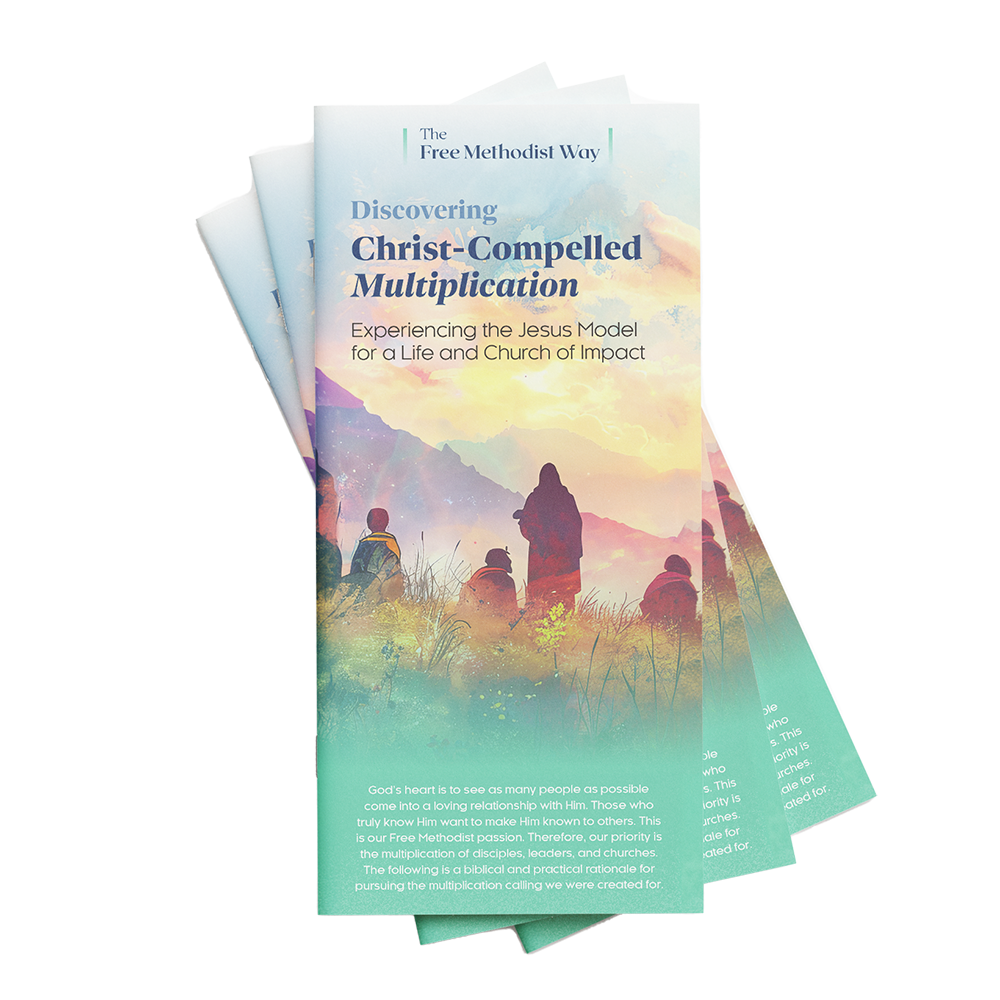Discovering Christ-Compelled Multiplication
by Rev. Dr. Larry and Rev. Dr. Deb Walkemeyer, Strategic Catalysts for Christ-Compelled Multiplication
Experiencing the Jesus Model for a Life and Church of Impact
God’s heart is to see as many people as possible come into a loving relationship with Him. Those who truly know Him want to make Him known to others. This is our Free Methodist passion. Therefore, our priority is the multiplication of disciples, leaders, and churches. The following is a Biblical and practical rationale for pursuing the multiplication calling we were created for.
The Multiplication Mandate at Creation
“Be fruitful and multiply” (Genesis 1:28). God’s first command in the Bible was given out of His desire to fill the earth with individuals who would receive and return His love. To fulfill this command, He endowed Adam and Eve with multiplication ability — the power, through love, to reproduce other humans like themselves. Their offspring would also have the desire and giftedness to reproduce, thus creating exponential results that can happen through multiplication.
The Multiplication Call of Jesus
“Follow me and I will make you fishers of people” (Matthew 4:19 NASB).
Jesus reiterated the call for multiplication found in Genesis by inviting a small group into a transformative relationship with Him. He granted these individuals spiritual rebirth, then called, empowered, and sent them to make disciples who would, in turn, reproduce more disciples. This multiplication of spiritual life aimed to fill the earth with new creations in Christ (2 Corinthians 5:15-21). Following Jesus meant fishing for Jesus. As Free Methodists, our understanding of holiness emphasizes and prioritizes obedience to this foundational multiplication command of Jesus’ ministry.
The Multiplication Commission of Jesus
“Therefore, Go and make disciples of all nations” (Matthew 28:19). Jesus concludes His earthly ministry by solemnly declaring his all-encompassing authority and power and His absolute Lordship (Matthew 28:18). Out of that ultimate truth, Jesus commissions His disciples to “Go and do with others what He has done with them.” He has taught them His wisdom and His commands. He has trained them in matters of spiritual life and ministry. Now, He gives them their life mission – repeat the process with others who will then duplicate this discipleship with others. This was Jesus’ final instruction on how to fill the earth with Jesus followers. As Free Methodists, we believe this original commission from Jesus is our life’s mission for today.
The Multiplication Power of Jesus
“And surely I am with you always, to the very end of the age” (Matthew 28:20). Jesus’ final words on earth were a promise of power. The multiplication commission He issued was simple, but it certainly was not easy. It would require a supernatural spiritual power. The disciples’ reliance could not be upon their own strength, strategies, or intellect. Consequently, understanding both the daunting size of the mission and the diminutive strength of the disciples, Jesus made a pledge, “I will be with you, all the way, always.”
This promise was repeated on the Mount of Olives, just prior to Christ’s ascension – “You shall receive power when the Holy Spirit has come upon you and you shall be my witnesses…” (Acts 1:8) The Holy Spirit’s power to make disciple makers and to bear witness to those who would then become witnesses of Jesus’ Lordship and fuel a global multiplication movement. Free Methodist multipliers are those women and men who rely on the power of the Spirit to carry out the multiplication mission of Jesus in their local context and to the ends of the earth. The task of the mission is accompanied by the power and authority of the Lordship of Jesus to complete the mission. The sanctifying power of Jesus includes the sending power of Jesus.
The Multiplication People of Jesus
“For we are God’s handiwork, created in Christ Jesus to do good works” (Ephesians 2:10a).
God created us physically and then made us new through Christ Jesus. We are not saved by our good works (Ephesians 2:8-9), but we are saved for good works. These good works are divine assignments that “God prepared in advance for us to do” (Ephesians 2:10b). While these works include various forms of service, our primary assignment is to fulfill Jesus’ great commission to make disciples. Every true Christian has this calling to multiply. We are all ordinary followers of Jesus, yet through the power of the Spirit, we can have an extraordinary impact. Even Jesus’ enemies were astonished that ordinary, uneducated individuals like Peter and John could exhibit such power and courage (Acts 4:13).
As Free Methodists, our origins emphasized the anointing of the Spirit on both laypeople and clergy for ministry. The teaching of the priesthood of all believers (see 2 Peter 1:9), based on the promise of the Spirit to all God’s people (Acts 2:16-17), is foundational to our identity. In the early years of Free Methodism, teams of Spirit-fueled laypeople, known as the Pentecost Bands, rapidly multiplied disciples and churches. This historical example within our Free Methodist tradition inspires and challenges us to engage in the work of multiplication.
The Multiplication Strategy of Jesus
“He appointed twelve that they might be with him and that he might send them out to preach” (Mark 3:14). Jesus’ public ministry lasted only three and a half years, providing a brief period to launch a movement intended to reach the world. Given this limited time, one might expect Jesus to focus on gathering large crowds to hear His teachings. Instead, He dedicated over 75% of His ministry to training a small group of disciples to become disciple-makers. When large crowds did gather, Jesus often shared challenging truths that caused many to disperse (John 6). His strategy relied on the power of multiplication.
As Mark 3:14 highlights, Jesus’ strategy involved selecting a few individuals to “be with Him” to equip them so “that He might send them out to preach.” Jesus invested in these disciples by spending time with them, allowing them to learn through observing and listening to Him. This approach was an apprenticeship in disciple-making, not a program to be completed or a curriculum to be finished, but a lifestyle to be emulated. Such personal, relational discipleship is what enables multiplication to occur. Jesus understood that a small group of disciples who multiply is more impactful than a large crowd that does not. This was Jesus’ strategy and must be ours as well. This principle is part of our Free Methodist heritage, an essential element of the early Methodist movement known as “bands,” which met weekly for deeply personal discipleship.
The Multiplication Handoff
“…Now teach these truths to other trustworthy people who will be able to pass them on to others.” (2 Timothy 2:2b, NLT)
Jesus’ multiplication plan started with disciple-making, but from that pool, it led to multiplying leaders. Jesus selected twelve leaders from among His followers. From among the twelve, He chose three who became pivotal leaders in the early church.
Paul did the same in that he selected apprentices to travel with him on his missionary journeys and then positioned them to oversee churches. He also appointed elders (Acts 14:23) and handed off leadership to them. Paul, however, was not just delegating leadership roles. He was raising up multiplication leaders, such as Timothy, commanding them to give their focus to raising up other leaders (2 Timothy 2:2). The emphasis was not just on leaders using their giftedness to add followers. It was on leaders empowering others to do the work of ministry.
This aligns with the purpose of church offices in Ephesians 4:11-12, where leaders are tasked with “equipping the saints to do the work of ministry.” This method fosters a multiplication-based leadership pipeline, driving the church’s growth as a movement. John Wesley exemplified this approach by empowering leaders at every level and encouraging them to reproduce themselves.
The Multiplication Priority of the Church
“So the church…walking in the fear of the Lord and in the comfort of the Holy Spirit, it multiplied” (Acts 9:31).
The expansion of the church occurred through the establishment of new congregations that, in turn, founded other new churches. Originating in Jerusalem, the New Testament church rapidly spread to distant places like Rome, covering approximately 1400 miles within two decades. These early churches served as centers for training and sending. For instance, the Antioch church exemplified this practice by commissioning two of its key leaders to initiate new congregations (Acts 13:1-3). The mindset prevalent in these churches was one of multiplication: constantly asking, “Who can we send?” and “How can we replicate?” This focus on reproduction fueled both the New Testament and early Free Methodist movements forward.
The Multiplication Impact
“…He took the disciples with him and had discussions daily…This went on for two years, so that all the Jews and Greeks who lived in the province of Asia heard the word of the Lord” (Acts 19:9-10).
The model of multiplication initiated by Jesus with His 12 disciples has now burgeoned into 2.5 billion Christians worldwide. Paul effectively employed this model in Ephesus, training disciples who then propagated churches across Asia (Acts 19:9-10). Yet, many everyday Christians are unaware of the remarkable impact they can achieve through multiplication.
Consider this: if a Christian were to devote a year to training just one person to make disciples, then the next year, those two would each take one person and repeat the process; there would be four. Then, if these four each spent a year training just one person, there would be eight. If this pattern continued each subsequent year, within 11 years, this process could yield over 2000 disciples, showcasing the formidable potential of multiplication in discipleship. When the Spirit empowers ordinary Christians to make disciple-makers (like Christ did), they unleash the exponential power of Christ-compelled multiplication.
God’s joyful and powerful invitation to every born-again believer is the same as the one he gave at the beginning – “Be fruitful and multiply”. May it be so in the Free Methodist church.


These full-color booklets will deepen your desire to live into the values of the Free Methodist Way. Each booklet focuses on various ways you or your small group, leadership board, or ministry team can pursue a life that reflects the values we all share and believe in so deeply. Engage with the values, pray that they will be a reality in your life or the life of your church, and learn more about them from our Strategic Catalysts who authored them.
They are ideal for new members, too, helping them be rooted in the values that define us as we all serve Christ and His Kingdom.
